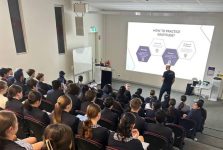Managing Test Anxiety
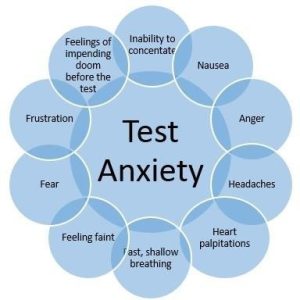
(Picture source: https://nursing.lsuhsc.edu/Aca...)
With exams just around the corner, I thought it would be appropriate to discuss some ideas on managing test anxiety.
Firstly, some anxiety before a test is perfectly normal. Research suggests that acknowledging, normalising and reflecting on our fears and anxieties could be highly beneficial for students before exams. Suppression and denial have never been effective coping mechanisms in dealing with anxiety. ‘Feel the fear but do it anyway’ is thus also a relevant concept in effectively managing test anxiety.
In a research study, students participated in a 10-minute exercise immediately before a test in which they were encouraged to see stress as ‘a beneficial and energizing force’. They learned that small amounts of stress can help sharpen focus and aid memory by increasing oxygen flow into the brain. Students were then asked to write responses to two questions: “How do people sometimes feel in important situations?” and “How can the way a person feels in important situations help them do well in those situations?” The writing exercise helped the students manage the ‘worried thoughts about the possibility of failure’ that often accompany a test, reducing the number of students failing out of the course by half. (Youki Terada, 2005 https://www.edutopia.org/article/simple-metacognitive-strategies-help-anxious-learners-succeed)
Therapist Aid (© 2023 Therapist Aid. All rights reserved.) provides the following very helpful guidance in managing test anxiety:
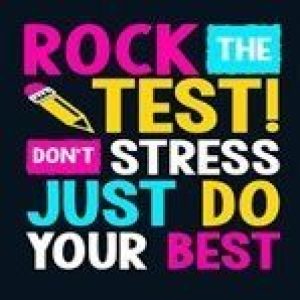
On the Test Day
(Image source: https://www.amazon.com.au/Rock...)
Come Prepared
- Get enough sleep. Forgoing sleep, in order to study, is actually associated with doing more poorly on the test.
- Avoid caffeine. It might be tempting to consume a lot of caffeine in order to feel alert, but caffeine can exacerbate anxiety.
- Arrive right on time. By doing this, you avoid anxiety-inducing situations, such as seeing others cramming for the test, discussing what will be on the test, and hearing others voice their own anxieties.
- Get comfortable. Eat a good meal before the test, wear comfortable clothes, and choose your favourite seat in the classroom (if you are allowed to do so, of course).
Use Test-Taking Strategies
- Consider doing a quick ‘memory dump’. Jot down important terms, formulas, or other relevant information as soon as you receive the test. This creates an information bank you can refer to throughout the test. However, don’t spend too much time on doing this, or fixate on the specific things you cannot recall straight away, it will most likely come back to you a bit later during the test.
- Take your best guess. Some students with test anxiety experience their mind going ‘blank’ when they get a test, regardless of how much they studied. The good news is, they haven’t actually lost all the information they studied, so taking an educated guess will usually be better than leaving an answer blank.
- Consider the point values. Skim the test to get an idea of the number of questions and their point values. Start with easier questions to build confidence and spend more time on questions that are worth more points.
- Check your work. Before handing in the test, go back and check that all answers are correct and complete. Not only will this cut down on errors, it will also reassure you that every question was answered to the best of your ability.
Tip: Don’t feel rushed by other students finishing the test early — just because someone finishes quickly, doesn’t mean they got everything right!
Relaxation Skills
Students may experience test anxiety before, during and after a test. Relaxation skills — such as deep breathing and progressive muscle relaxation — can be used to manage this anxiety. For best results, students should practice these techniques regularly, rather than using them only on test day.
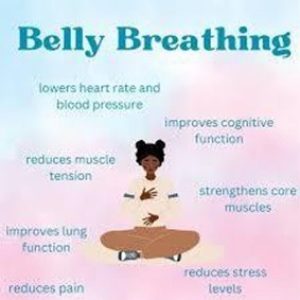
(Image source: https://www.instagram.com/p/Ci...)
Deep Breathing
Deep breathing reduces anxiety by slowing heart rate, lowering blood pressure and triggering a feeling of relaxation. Concentrating on breathing also distracts from negative thoughts related to testing. Deep breathing is discreet, effective and easy to use. Here is how to practice:
How to Use Deep Breathing
- Sit back in a comfortable position and close your eyes if you feel comfortable doing so. TIP: When learning deep breathing, place one hand on your abdomen so you can feel it rise and fall with each breath.
- Breathe in slowly through your nose for four seconds.
- Hold the air in your lungs for four seconds (or less, if this becomes uncomfortable).
- Pucker your lips, and slowly exhale through your mouth. Time the exhalation to last six seconds. TIP: For practice, try exhaling through a straw. This will get you in the habit of exhaling slowly.
Repeat the breathing cycle for at least two minutes.
Tip: Because deep breathing can be used discreetly, it is a great choice for anxiety reduction during a test.

(Image source: https://how-to-relax.com/progr...)
Progressive Muscle Relaxation (PMR). In this technique, students learn to slowly tense and relax their muscles, one by one. By doing this, they learn the difference between the feelings of tension and relaxation, and learn to consciously relax their muscles in order to feel calm. Students are encouraged to practice this technique daily. Here is how to use it:
How to Use Progressive Muscle Relaxation
- Sit back or lie down in a comfortable position. You may close your eyes.
- Beginning at your feet, notice how your muscles feel. Are they tense, or relaxed?
- Tightly tense the muscles in your feet by curling your toes. Hold the tension for five to ten seconds.
- Release the tension from your feet and allow them to relax. Notice how different the states of tension and relaxation feel.
- Move up your body, repeating the cycle of tensing and relaxing each group of muscles. Be sure to practice on the following groups of muscles: legs, pelvis, stomach, chest, back, arms, hands, neck and face.
Cognitive Restructuring

(Image source: https://www.sandstonecare.com/...)
Identify cognitive distortions. Cognitive distortions are irrational thoughts or unhelpful thinking styles that tend to be negative in nature. Irrational thoughts lack evidence, but can still lead to feelings such as depression, anger and anxiety. Students with test anxiety may hold a number of cognitive distortions related to test-taking.
Below are some examples of test-related cognitive distortions:
- “I’m going to fail!”
- “If I don’t get an A, I’m worthless.”
- “All my classmates are smarter than me. There’s no way I’ll do well on this test.”
- “I never do well on tests, so I won’t do well on this one.”
- “I passed the first test, but only because it was easy.”
- “If I don’t do well on this test, I’ll never get a job.”
- “The teacher doesn’t like me, so he’ll probably give me a bad grade.”
Challenge cognitive distortions. Once students identify cognitive distortions that are harmful, they can challenge them by examining the evidence. Socratic questioning, decatastrophizing, and putting thoughts on trial are techniques that can be used for this purpose. Once cognitive distortions are challenged, they can be replaced with rational, adaptive thoughts.
Use positive self-talk. Self-talk refers to internal dialogue, or statements people say to themselves. Negative self-talk regarding test-taking ability leads to negative feelings about testing, which can lead to poorer test performance.
Positive self-talk, on the other hand, leads to positive feelings about testing, and can improve test performance. Below are some examples of positive self-talk:
- “I’m well-prepared for this test.”
- “I’m going to do my best.”
- “I can get through this.”
- “This is going to be okay.”
- “Tests are never as bad as I think they’ll be.”
- “Even though I’m anxious, I can still do well.”
- “I’ll use relaxation skills to calm down.”
- “I can see myself passing this test.”
So, how can students actually use positive self-talk? Start by creating a list of rational, realistic and believable positive statements (e.g. “I studied well”, rather than, “I’m the smartest person in the world.”). Statements should be rehearsed at least once a day, but more practice is better.
Here are some ways to use positive self-talk to reduce test anxiety:
- Make a habit of using positive self-talk. Place the list of positive (and realistic!) statements somewhere prominent — such as on a mirror, desk, or nightstand — and repeat the statements whenever you see the list.
- Link statements to physical cues. Say a positive statement whenever you pick up your backpack, sit down at a desk, or put on headphones. With enough use, these actions come to trigger a positive thought.
- Use positive self-talk during the test. Even if you have been practicing positive self-talk, the testing situation will still be stressful, and negative thoughts might return. Positive self-talk can counteract this negative thinking, and increase self-confidence.
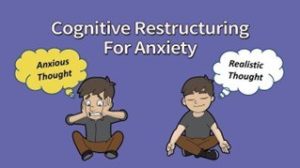
(Image source: https://www.youtube.com/watch?...)
Squeezing a stress ball whilst engaging in positive self-talk helps some students manage their test anxiety better.
Research on Positive Self-talk
Researchers found that a simple, five-minute exercise can help boost maths performance, especially for students who have poor confidence in their maths ability. When students silently spoke words of encouragement to themselves that were focused on effort — saying phrases such as “I will do my very best!” — their maths scores improved. (Thomaes et al).
In a research study, students who had participated in self-talk focused on effort improved their maths performance on the test. These students silently said to themselves words of encouragement focused on effort. The second group did a similar activity, but the words were focused on ability, favouring phrases such as “I’m very good at this”. The third group did not engage in self-talk at all. Those who engaged in self-talk focused on ability, or no self-talk at all, experienced no improvement.
So why doesn’t self-talk focused on ability work? Saying “I am the best” can feel like a hollow claim when students don’t feel confident about their own abilities — they’re likely to dismiss the message entirely, explained the researchers. But telling yourself “I will try my hardest” is an achievable goal, shifting attention away from a perceived lack of ability toward something within a student’s control: effort.
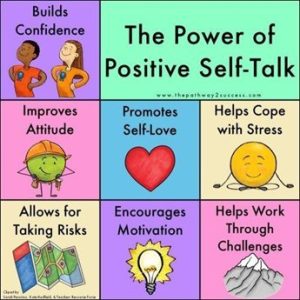
(Image source: https://blogs.dal.ca/healthyda...)
I thought I would end this section with the visual below, reminding us of some of the things that have the potential to make anxiety worse during exam times.
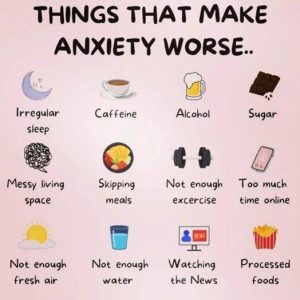
Until next time,
Marisa Smit
CGS Psychologist
References
- Therapist Aid. (https://www.therapistaid.com/therapy-guide/treating-test-anxiety) Treating Test Anxiety. © 2023 Therapist Aid. All rights reserved.
- Terada, Y. (2020). Simple Metacognitive Strategies to Help Anxious Learners Succeed.
(https://www.edutopia.org/article/simple-metacognitive-strategies-help-anxious-learners-succeed)
- Thomaes, S, Tjaarda, I.S., Brummelman, E. & Sedikides, C. (2019). Effort Self-Talk Benefits the Mathematics Performance of Children With Negative Competence Beliefs. Child Development 91(6).
- Akinsola, E. F., & Nwajei, A. D. (2013). Test anxiety, depression and academic performance: assessment and management using relaxation and cognitive restructuring techniques. Psychology, 4(06), 18.
Hatzigeorgiadis, A., Zourbanos, N., Mpoumpaki, S., & Theodorakis, Y. (2009). Mechanisms underlying the self-talk–performance relationship: The effects of motivational self-talk on self-confidence and anxiety. Psychology of Sport and Exercise, 10(1), 186–192.
- Hong, E., Sas, M., & Sas, J. C. (2006). Test-taking strategies of high and low mathematics achievers. The Journal of Educational Research, 99(3), 144–155.
Ribeiro, J. A., & Sebastiao, A. M. (2010). Caffeine and adenosine. Journal of Alzheimer’s Disease, 20(s1), S3–S15.
Salend, S. J. (2011). Addressing test anxiety. Teaching exceptional children, 44(2), 58–68.
- Studying 101: Study Smarter Not Harder. (n.d.). Retrieved from https://learningcenter.unc.edu....
Study Tips. (n.d.). Retrieved from http://uaap.mit.edu/tutoring-support/study-tips/mastering-tests/draft-study-plan.
Why Sleeping May Be More Important Than Studying. (2013, January 11). Retrieved from https://www.kqed.org/mindshift/26079/why-sleeping-may-be-more-important-than-studying.

 894
894







